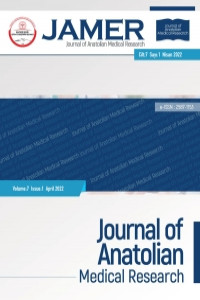Abstract
Giriş: Atropa belladona geniş bir coğrafyada ulaşılabilir olan, görünümü birçok meyve ile karışabilen ölümcül etkileri olabilen bir bitkidir. Yedi gün içerisinde hastanemiz acil servisine başvuran dokuz olgunun verileri ışığında Atropa Belladonna zehirlenmesine dikkat çekmeyi amaçladık.
Vaka sunumları: Yedi gün içinde hastanemizin acil servisine başvuran dokuz hastayı değerlendirdik. Bu hastaların çoğu diğer meyvelere benzeterek tüketmişti. Bir hasta kasten yutmuştu. İki hasta, hastaneye başvurmaya çalışırken antikolinerjik etkiler nedeniyle trafik kazası geçirmişti. En sık bildirilen semptomlar ağızda kuruluk ve konuşma bozukluğu iken bunu dudaklarda parestezi, bulantı, iki taraflı alt ekstremitelerde güç kaybı, ajitasyon ve geçici bilinç kaybı gibi diğer semptomlar izledi. Olguların sekizi yoğun bakıma yatırıldı, biri ayaktan taburcu edildi.
Sonuç: Doğada ulaşması kolay olan bu bitki ve meyvesi hakkında toplum bilinçlendirilmelidir. Özellikle yaz mevsimlerinde sağlık çalışanları benzer klinik ile gelen hastalarda hikaye ayrıntılı sorgulanmalıdır.
Keywords
References
- 1. Southgate HJ, Egerton M, Dauncey EA. Lessons to be learned: a case study approach: Unseasonal severe poisoning of two adults by deadly nightshade (Atropa belladonna). J R Soc Promot Health. 2000;120(2):127–30.
- 2. Lee MR. Solanaceae IV: Atropa belladonna, deadly nightshade. Journal-Royal Coll Physicians Edinburgh. 2007;37(1):77.
- 3. Berdai MA, Labib S, Chetouani K, Harandou M. Case Report-Atropa Belladonna intoxication: A case report. Pan Afr Med J. 2012;11(1).
- 4. Trabattoni G, Visintini D, Terzano GM, Lechi A. Accidental Poisoning with Deadly Nightshade Berries: A Case Report. Hum Exp Toxicol. 1984;3(6):513–6.
- 5. Fanatik [Internet]. İstanbul, Turkey. Available from: https://www.fanatik.com.tr/avrat-otu-nedir-avrat-otunun-faydalari-nelerdir-avrat-otu-ne-ise-yarar-ne-icin-kullanilir-2146306
- 6. Kwakye GF, Jiménez J, Jiménez JA, Aschner M. Atropa belladonna neurotoxicity: Implications to neurological disorders. Food Chem Toxicol. 2018;116:346–53.
- 7. Almubayedh H, Albannay R, Alelq K, Ahmad R, Ahmad N, Naqvi AA. Clinical uses and toxicity of Atropa belladonna; an evidence based comprehensive retrospective review (2003-2017). Biosci Biotechnol Res Commun. 2018;11(1):41–8.
- 8. Burns MJ, Linden CH, Graudins A, Brown RM, Fletcher KE. A comparison of physostigmine and benzodiazepines for the treatment of anticholinergic poisoning. Ann Emerg Med. 2000;35(4):374–81.
- 9. Joshi P, Wicks AC, Munshi SK. Recurrent autumnal psychosis. Postgrad Med J. 2003;79(930):239–40.
Abstract
Introduction: Atropa belladonna is an available plant in a wide geographical area that has an appearance that can be confused with many fruits and potential lethal effects. We aimed to draw attention to Atropa belladonna poisoning in the light of the data of 9 cases who appealed to the emergency department of our hospital within 7 days.
Case Reports: We evaluated 9 patients who appealed to the emergency service of our hospital within the seven day. Most of these patients had ingested by confusion with other fruits. One patient had ingested deliberately. Two patients had experienced traffic accidents due to anticholinergic effects during attempt to appeal to the hospital. The most commonly reported symptoms were xerostomia and incoherent speech followed by other symptoms such as paresthesia in lips, nausea, loss of strength in bilateral lower extremities, agitation and temporary loss of consciousness. Eight of the cases were admitted in the intensive care unit one case was discharged as outpatient.
Conclusion: The awareness of the public should be raised about this easily accessible plant and its fruit in the nature. The healthcare providers should comprehensively investigate the history of the patients applying with similar clinic particularly in the summer season.
Keywords
References
- 1. Southgate HJ, Egerton M, Dauncey EA. Lessons to be learned: a case study approach: Unseasonal severe poisoning of two adults by deadly nightshade (Atropa belladonna). J R Soc Promot Health. 2000;120(2):127–30.
- 2. Lee MR. Solanaceae IV: Atropa belladonna, deadly nightshade. Journal-Royal Coll Physicians Edinburgh. 2007;37(1):77.
- 3. Berdai MA, Labib S, Chetouani K, Harandou M. Case Report-Atropa Belladonna intoxication: A case report. Pan Afr Med J. 2012;11(1).
- 4. Trabattoni G, Visintini D, Terzano GM, Lechi A. Accidental Poisoning with Deadly Nightshade Berries: A Case Report. Hum Exp Toxicol. 1984;3(6):513–6.
- 5. Fanatik [Internet]. İstanbul, Turkey. Available from: https://www.fanatik.com.tr/avrat-otu-nedir-avrat-otunun-faydalari-nelerdir-avrat-otu-ne-ise-yarar-ne-icin-kullanilir-2146306
- 6. Kwakye GF, Jiménez J, Jiménez JA, Aschner M. Atropa belladonna neurotoxicity: Implications to neurological disorders. Food Chem Toxicol. 2018;116:346–53.
- 7. Almubayedh H, Albannay R, Alelq K, Ahmad R, Ahmad N, Naqvi AA. Clinical uses and toxicity of Atropa belladonna; an evidence based comprehensive retrospective review (2003-2017). Biosci Biotechnol Res Commun. 2018;11(1):41–8.
- 8. Burns MJ, Linden CH, Graudins A, Brown RM, Fletcher KE. A comparison of physostigmine and benzodiazepines for the treatment of anticholinergic poisoning. Ann Emerg Med. 2000;35(4):374–81.
- 9. Joshi P, Wicks AC, Munshi SK. Recurrent autumnal psychosis. Postgrad Med J. 2003;79(930):239–40.
Details
| Primary Language | English |
|---|---|
| Subjects | Health Care Administration |
| Journal Section | Makale |
| Authors | |
| Publication Date | April 1, 2022 |
| Acceptance Date | March 21, 2022 |
| Published in Issue | Year 2022 Volume: 7 Issue: 1 |

